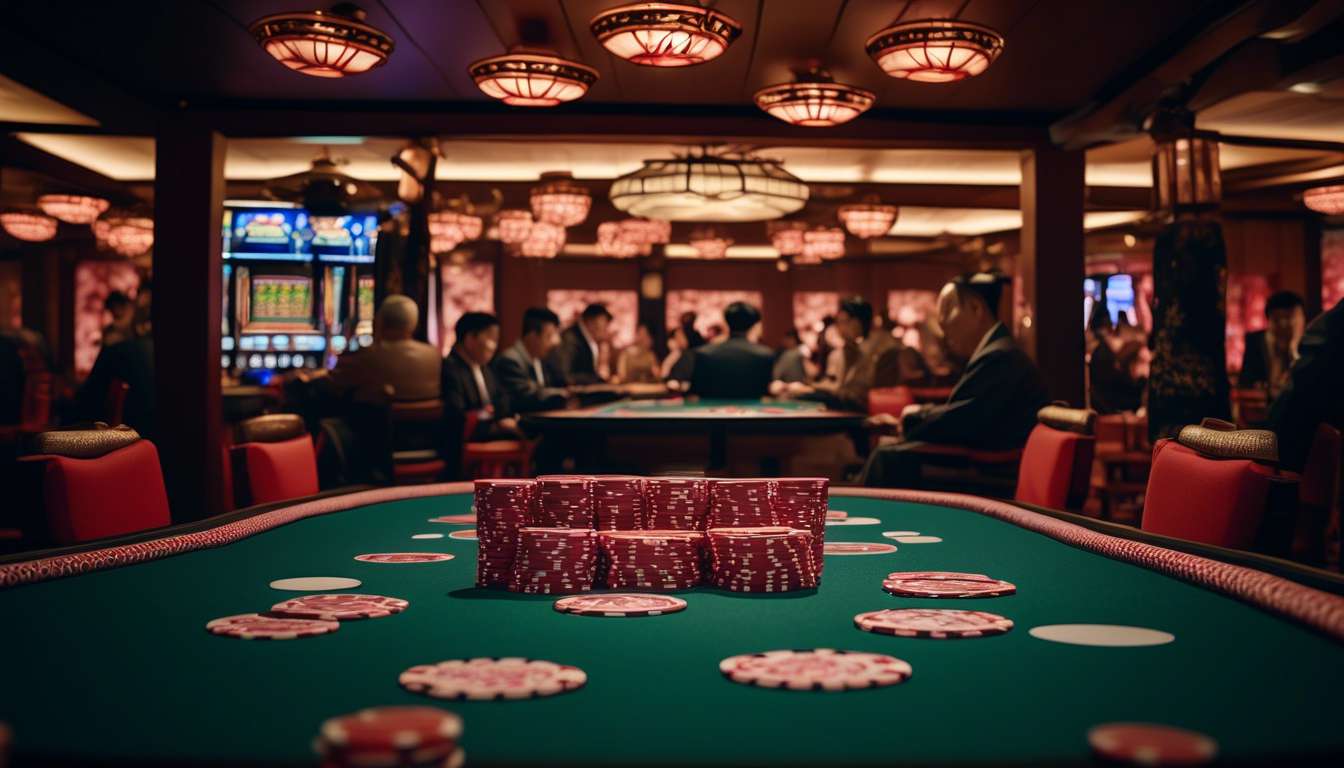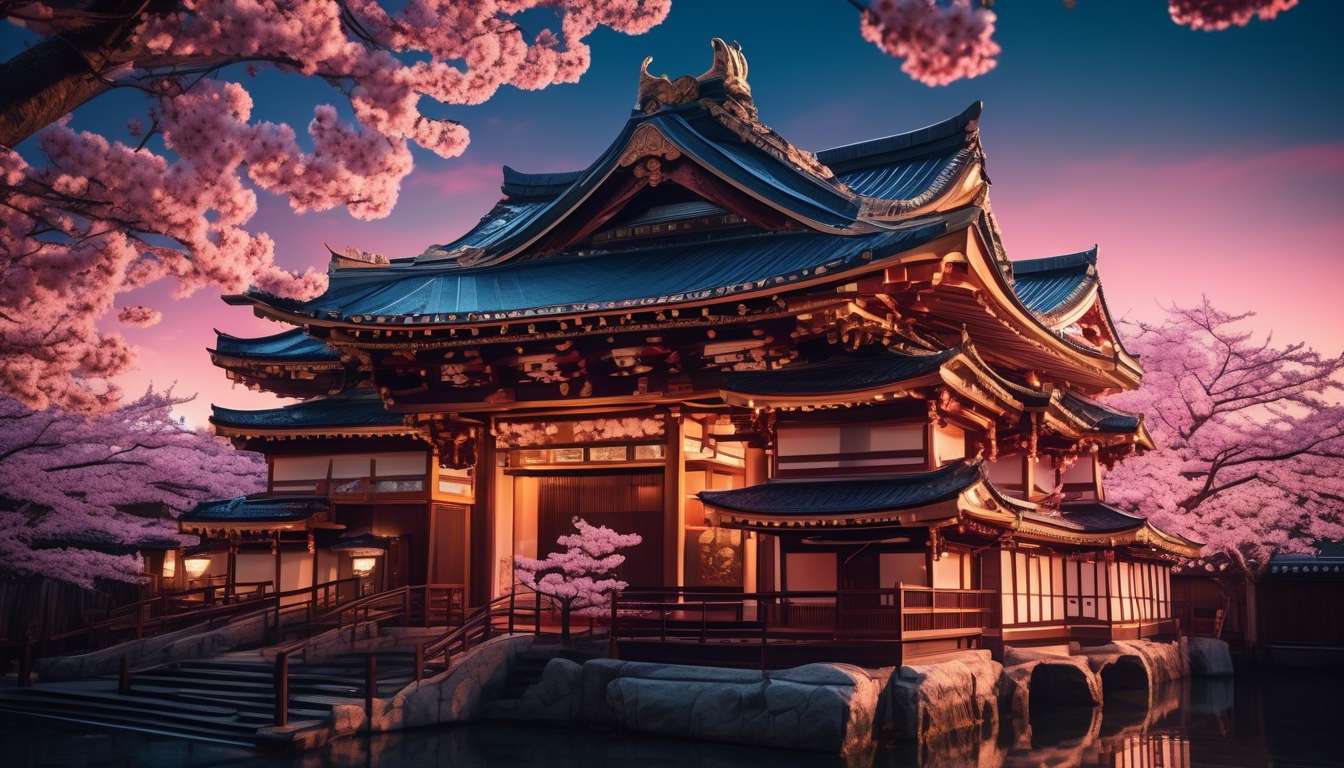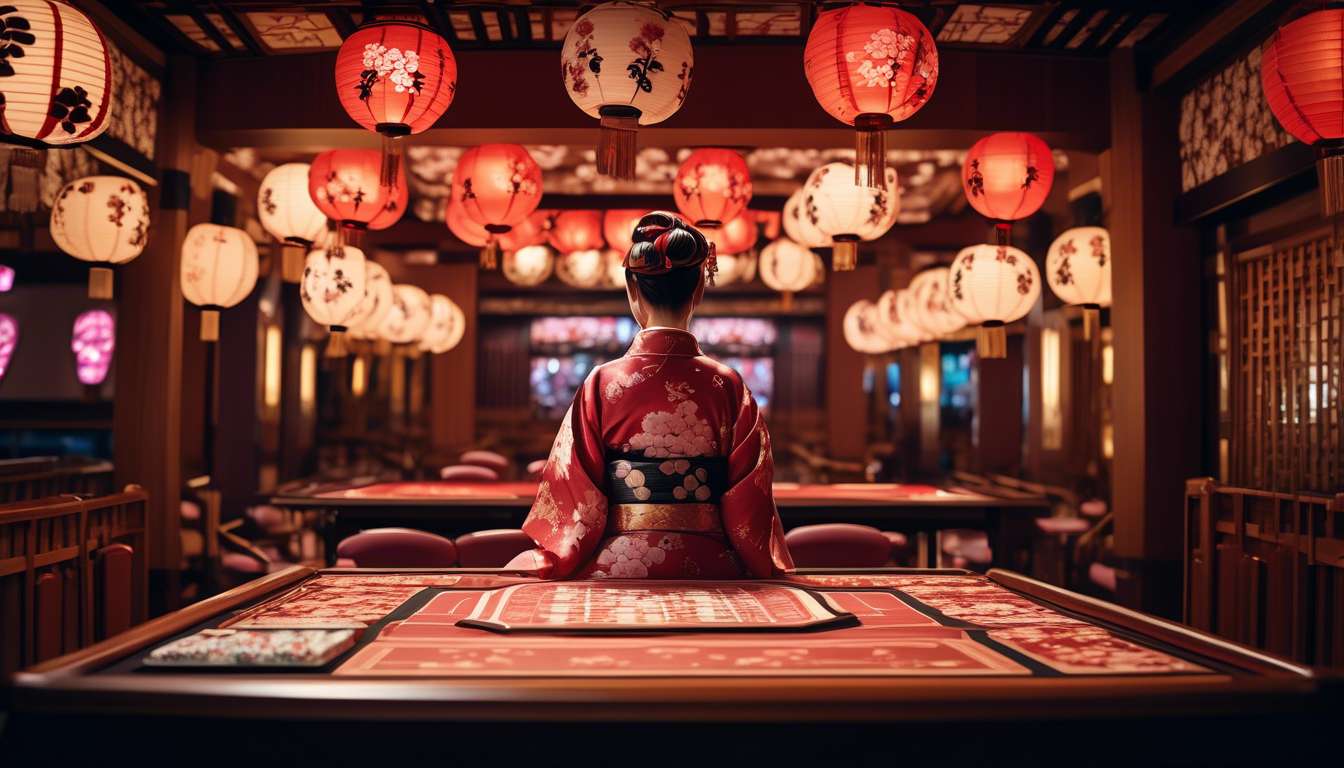As we delve into the fascinating journey of poker tournaments in Japan, we find ourselves tracing a path filled with cultural shifts and regulatory changes.
We have witnessed how poker, once considered a niche pastime, has gradually evolved into a prominent and respected sport.
Our exploration begins with the early days, when poker was played quietly in small circles, often overshadowed by traditional Japanese games. Over time, as global influences seeped into Japan, we saw poker’s potential to captivate audiences and cultivate a community of passionate players.
Together, we’ve observed:
- The rise of poker clubs
- The increasing acceptance of tournaments
These changes reflect a broader cultural shift towards embracing international trends.
As we navigate the complexities of legal frameworks and societal perceptions, we celebrate the ingenuity and resilience of the poker community in Japan.
Our journey is not just about the game itself, but about how it mirrors the dynamic evolution of Japanese society.
Early Roots of Poker in Japan
Poker’s early roots in Japan can be traced back to the mid-20th century when the game began gaining popularity through American cultural influences. As we embraced these new ideas, poker tournaments started to emerge, capturing our imaginations and drawing us into a shared experience beyond traditional pastimes. It was a time when we craved connection and camaraderie, and poker offered a thrilling way to build our community.
Navigating the legal landscape presented challenges, but we saw opportunities for legal adaptations that allowed this burgeoning pastime to flourish. We learned to work within existing frameworks, ensuring that our gatherings were both enjoyable and compliant. This adaptability was crucial in fostering an environment where poker could thrive.
Together, we laid the foundation for a vibrant poker culture. By participating in tournaments and engaging with one another, we forged lasting bonds and created a sense of belonging. Poker was more than a game; it was a way for us to connect, collaborate, and celebrate our shared passion.
Emergence of Poker Clubs
As poker’s popularity surged, numerous clubs sprang up across Japan, providing enthusiasts with dedicated spaces to play and hone their skills. We found ourselves part of a vibrant community, where the love for the game brought us together.
These poker clubs served as the heartbeat of our community, each with its own unique atmosphere and camaraderie. We connected with players who shared our passion, fostering a sense of belonging and mutual support.
Legal adaptations were necessary to accommodate the rise of these clubs. Changes allowed us to host poker tournaments without breaching gambling laws.
This legal clarity encouraged more clubs to open, further solidifying their role in community building. Our gatherings became more than just games; they were opportunities to learn from each other and grow as players.
Through these clubs, we cultivated friendships and developed strategies, setting the stage for the poker tournaments that would soon capture our imaginations and elevate our skills.
Transition to Tournament Culture
As our passion for poker deepened, we naturally shifted from casual games at clubs to the competitive thrill of organized tournaments. It wasn’t just about the game; it was about building a community where we could share our love for poker. We came together, driven by the excitement of poker tournaments, to create a space that felt like home.
Navigating the legal adaptations was essential for this transition. With Japan’s strict gambling laws, we found innovative ways to comply while still fostering our burgeoning tournament culture. We worked diligently to ensure that our gatherings were both thrilling and lawful, drawing more enthusiasts into our fold.
As we organized these events, our community grew stronger. The poker tournaments weren’t just competitions; they were social events that united us in camaraderie and shared ambition.
We:
- Celebrated each other’s victories
- Learned from our losses
This helped in creating a supportive network that extended beyond the poker table, solidifying our place in Japan’s poker scene.
Influence of Global Trends
Global Trends and Local Innovation
Global trends have significantly shaped how we approach and organize poker tournaments in Japan. Observing the international poker scene inspires us to enhance our local events, fostering a sense of belonging among players. These global influences push us to innovate and elevate the experience, ensuring our tournaments resonate with both local and international participants.
Legal Adaptations and Challenges
We’ve seen how legal adaptations globally impact our approach. By learning from other countries, we strive to create environments that respect regulations while embracing the excitement of the game. These adaptations help us navigate challenges and ensure our tournaments remain vibrant and engaging.
Community Building and Cultural Bridging
Community building stands at the heart of our evolution. By staying attuned to global trends, we craft events that unite fans and players, creating a shared passion for poker.
We’re not just organizing tournaments; we’re cultivating a community that thrives on camaraderie and shared experiences. Together, we’re bridging cultures, making Japan’s poker scene a dynamic and welcoming space for all.
Legal Challenges and Adaptations
Navigating Japan’s legal landscape presents unique challenges as we adapt our poker tournaments to align with both local and international regulations. Our goal is to ensure that our events remain inclusive and welcoming, fostering a sense of belonging among participants.
Legal adaptations are crucial as we work with authorities to clarify distinctions between recreational and gambling activities. This process requires us to be proactive in modifying tournament structures and rules to fit within the legal framework.
By focusing on transparency and compliance, we ensure our poker tournaments are accessible while maintaining integrity. We’ve collaborated with legal experts to interpret and implement these regulations, ensuring our community feels secure and valued.
Our adaptations aren’t just about following the law; they’re about creating an environment where players can enjoy the game without apprehension. Together, we strive to build a resilient poker community in Japan, where everyone can participate confidently and contribute to the vibrant culture of the game.
Community Building and Unity
We’re committed to fostering a strong sense of unity and camaraderie among players, creating an inclusive community that thrives on shared passion and respect.
Poker tournaments in Japan have evolved not just through legal adaptations but also through the heart of community building. As we gather around the poker table, we find more than just a game; we discover a shared journey that bridges diverse backgrounds and experiences.
Together, we celebrate victories and embrace challenges, knowing each hand dealt brings us closer, teaching us resilience and strategy. Our tournaments provide a platform where:
- Friendships are forged
- Mutual respect is cultivated
Legal adaptations have opened doors for more inclusive and frequent gatherings, allowing us to grow as a community.
We nurture this environment by:
- Encouraging open dialogue
- Promoting collaboration
- Ensuring everyone feels valued and heard
Through our collective efforts, we’re creating a supportive space where poker enthusiasts can belong, thrive, and connect deeply.
Professionalization of Poker Players
With the rise of poker’s popularity in Japan, we’re seeing a shift towards a more structured and professional approach to developing players’ skills and careers. Poker tournaments are no longer just recreational; they’re becoming platforms for serious contenders aiming to make a mark.
Legal adaptations have played a crucial role in this transformation by:
- Allowing us to organize more sanctioned events.
- Nurturing a competitive environment essential for professional growth.
As part of a passionate community, we understand the importance of supporting one another on this journey. Community building is at the heart of our efforts, creating networks that facilitate:
- Knowledge sharing.
- Mentorship.
We participate in local and international tournaments, gaining exposure and experience that sharpen our skills.
Together, we’re fostering an atmosphere where aspiring players can thrive. By embracing these changes, we’re paving the way for a new era in Japanese poker, where professionalism isn’t just an aspiration but a tangible reality for many of us.
Impact on Japanese Society
The growing popularity of poker in Japan is reshaping cultural norms and social dynamics in unexpected ways.
Poker tournaments have become vibrant hubs for community building, where individuals from various walks of life come together, united by a shared passion. These gatherings foster a sense of belonging, bridge societal gaps, and nurture new relationships.
Legal adaptations have played a crucial role in integrating poker into our social fabric. As regulations evolve, they create a safer and more inclusive environment for enthusiasts. This legal framework not only legitimizes poker but also encourages participation from those who may have previously felt hesitant.
We’re witnessing a shift in perceptions, as poker is increasingly viewed as a strategic game rather than mere gambling. This shift is fostering a culture of strategic thinking and healthy competition.
As we collectively embrace this evolution, poker tournaments are not just games; they’re platforms for personal growth and social cohesion in Japan’s society.
What are the key differences between Japanese poker tournaments and those held in Western countries?
Key Differences Between Japanese and Western Poker Tournaments
Cultural Elements and Regulations in Japan:
-
Japanese tournaments often feature unique cultural elements that reflect local traditions and customs.
-
Due to stricter gambling laws, these tournaments are subject to stricter regulations compared to Western counterparts.
Scale and Gameplay in Western Tournaments:
-
Western tournaments are generally larger in scale, attracting a greater number of participants.
-
The gameplay in Western tournaments tends to be more aggressive, with players often focusing heavily on prize money.
Atmosphere and Player Interactions:
-
The atmosphere and player interactions can vary significantly between the two regions.
-
This variation reflects the diverse cultural norms and strategies that are prevalent in each region.
How has online poker influenced the popularity of poker tournaments in Japan?
Online poker has significantly boosted the popularity of tournaments in Japan.
We can’t deny its impact on attracting more players and creating a vibrant poker community. The convenience of playing from home has drawn in a diverse group of enthusiasts.
This accessibility has made the game more inclusive and engaging, leading to a surge in interest and participation.
The online platform has truly revolutionized the poker scene in Japan.
What role do sponsors play in the growth of poker tournaments in Japan?
Sponsors play a crucial role in the growth of poker tournaments in Japan.
Their financial support helps to organize bigger and more prestigious events. This, in turn, attracts top players and increases public interest.
By providing resources and visibility, sponsors contribute to the overall success and sustainability of the tournaments. Without their backing, it would be challenging to maintain the level of competitiveness and excitement that draws participants and spectators alike.
Conclusion
In conclusion, the evolution of poker tournaments in Japan has been a fascinating journey, marked by several key developments:
- The growth of poker clubs
- The transition to a tournament culture
- The professionalization of players
Despite facing legal challenges, the community has thrived, influenced by global trends and fostering unity.
As poker continues to make its mark on Japanese society, it serves as a testament to the passion and dedication of players in shaping a vibrant and dynamic poker scene in the country.




